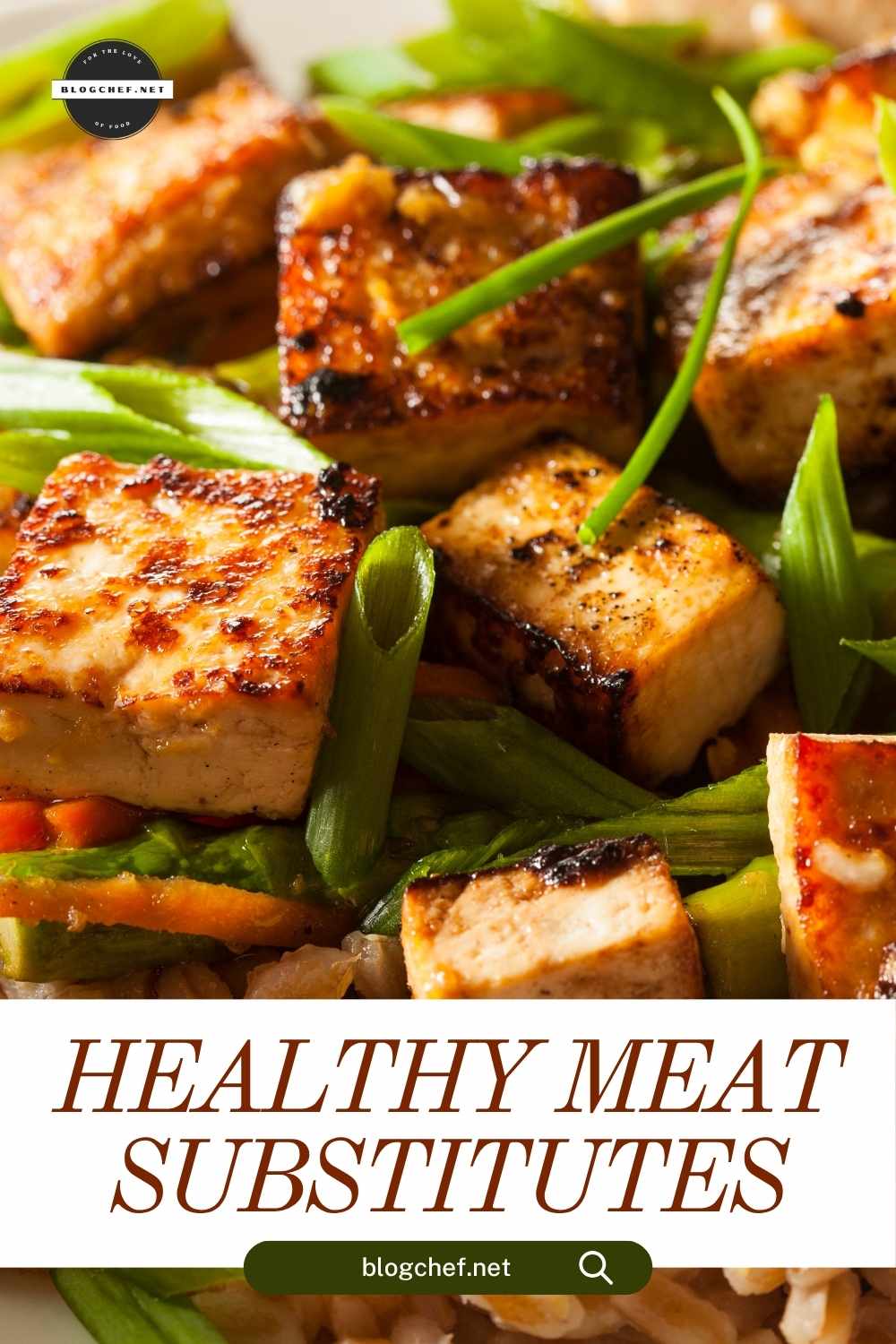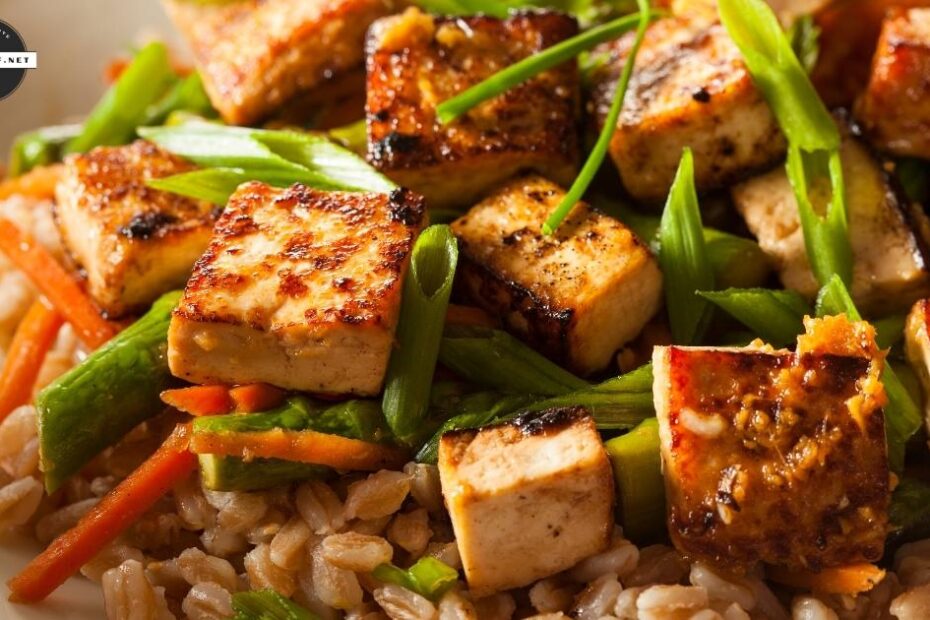Want to slash your grocery spending while improving the health profile of your diet? One strategy is to switch away from meat. Plant-based proteins are less expensive than meat and have more health advantages.
Our picks for healthy plant-based proteins are tempeh, jackfruit, textured vegetable protein, pea protien, and soy. Keep reading to learn how each can fit into your diet routine.

6 healthiest meat substitutes
Here’s a closer look at our five favorite plant-based alternatives to meat.
Tempeh
Tempeh is a nutritious and versatile meat alternative made from fermented soybeans. It is a rich source of protein — approximately 31 grams per cup. As a whole food, it serves as a fantastic plant-based option for those following vegetarian or vegan diets. It also provides essential amino acids, vitamins, and minerals. Its unique fermentation process enhances its flavor and makes it easier to digest compared to other soy products like tofu.
Jackfruit
Jackfruit is a tropical fruit known for its large size and distinctive flavor. It has a fibrous texture, making it ideal for pulled “meat” dishes. Nutritionally, jackfruit is low in calories and fat, providing a good source of carbohydrates. It contains vitamins A, C, and several B vitamins, along with minerals like potassium and magnesium. Additionally, jackfruit is rich in dietary fiber, which aids digestion and promotes a feeling of fullness.
Textured vegetable protein (Tvp)
Textured vegetable protein (TVP) is a versatile meat alternative made from soy protein. It has a chewy texture that mimics the real thing, so it’s a good option for burgers, meat crumbles, and sausages.
TVP is a nutritional powerhouse, derived from whole food sources. It contains about 15 grams of protein per serving. It’s also low in saturated fat and contains essential amino acids, making it one of the healthiest meat alternatives available.
Pea protein
Pea protein is derived from yellow split peas. It is rich in essential amino acids, particularly lysine, making it an excellent choice for vegans and vegetarians. Pea protein contains iron, magnesium, and potassium. With a low allergenic potential, it is suitable for those with common food allergies. It is also easily digestible.
Tofu
Tofu is a versatile meat substitute made from soybeans. It provides around 10 grams of protein per half-cup serving. Tofu is also low in calories and contains essential amino acids, iron, calcium, and isoflavones. Isoflavones have been linked to various health benefits, including reduced risk of heart disease and improved bone health.
Read next:
- Tofu ratatouille recipe
- 3 ways to cook extra-firm tofu
- These 5 tofu recipes might persuade you to go vegetarian
Seitan
Seitan is made from wheat gluten. It has a chewy texture that resembles traditional meat, so it stands in nicely in burgers and sausages. Seitan provides 25 grams of protein per 100 grams. It is low in saturated fat and calories, but it can have a lot of sodium.
What to make with meat alternatives
All five meat alternatives can be crumbled and used as alternatives in most ground beef or ground turkey recipes. Some dishes to try are:
- Chili — try our pumpkin chili recipe
- Spaghetti bolognese
- Tacos
- Stir-fry
- Vegetable burgers
- Stuffed peppers
- Shepherd’s pie
- Meatloaf
- Meatballs — try our Asian meatballs recipe
- Curry
- Enchiladas
- Filling meat-free salads with greens, legumes and/or lentils
The trick is to choose dishes that have seasonings which carry the flavor. For example, a robust taco seasoning can make crumbled tofu or tempeh taste like the real thing. Also, jackfruit has a stringy texture that makes for a nice substitute to pulled pork.
Are meat alternatives healthier than conventional meat?
If you consume a lot of meat currently, eating less meat could have health benefits. A 2020 study concluded that eating red meat and processed meats increases the risk of heart disease and death. In this context, processed foods are bacon, sausage, deli meats, and canned meats, which are often less healthy than whole food plant alternatives. Those who ate two servings of red or processed meats weekly had a 3% to 7% higher chance of cardiovascular disease.
Another study links plant-based diets to better weight control, cardiovascular health, and diabetes prevention. Heavier consumption of plant foods also decreases the environmental impact of food systems.
In sum, yes, eating fake meats can improve your health. Dropping meat entirely from your diet may increase your risk of iron, zinc, or vitamin B12 deficiencies, however.
What to look for in a plant-based meat alternative
Not all processed meat alternative products are equally healthy. For example, packaged vegetarian burgers, plant-based chicken nuggets, and meat-free sausages can be very high in sodium and lack dietary fiber. If your goal is to eat healthier, you want to avoid those options. Follow the tips below to spot them.
Ingredients
Always read the ingredient list to find out exactly what’s in your fake meat product. Choose a product with recognizable whole food ingredients like beans, whole grains, legumes, nuts, or seeds. If you have food sensitivities, you may need to avoid products with soy or gluten.
Protein
Plant-based foods often have less protein than meat-based foods. The protein content is often highest in products made with soy isolates, TVP, and wheat gluten.
You can also combine multiple sources of plant-based protein in your meals to increase your intake. Cannellini beans, lentils, and peanuts (and other whole legumes) are also high in protein.
Sodium
Processed plant-based foods like meatless burgers and sausages often have a lot of added salt. For example, one serving of Impossible Foods sausage links contains 630 mg of sodium, or 27% of the daily recommended intake.
Improved health outcomes
Plant-based products can supply dietary protein that’s low in saturated fat. Even better, less processed proteins like tofu and tempeh can be easily crumbled and used in place of ground meats in your favorite recipes. Using these ingredients to make your own, say, plant-based burgers and non-meat tacos is likely to be healthier than eating store-bought, prepared vegan entrees.
Long-term, opting for vegan proteins in lieu of meats can help you feel healthier. And, with their lower impact on the environment, your plant-based choices also contribute to a healthier planet.
